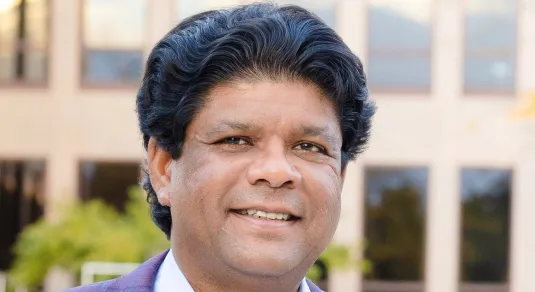
This Q&A is a part of Central Times’ 2025 city council election coverage. To see interviews with all candidates in the race, click here. This interview has been edited for length and clarity.
What inspired you to run for Naperville City Council?
I have lived in Naperville for more than 20 years, and one of the biggest challenges we are facing is economic inequality. About 40% of Naperville’s total land area houses 60% of the students in our school districts. That same 40% only has 12% of the businesses, meaning most of the residents in south Naperville are paying for schools primarily through their property taxes. Meanwhile, the other 60% of the city has fewer students but 70-80% of the businesses, creating an economic surplus.
The result is higher property taxes in the southern part of the city — about 2.5% compared to 2% elsewhere. As property values increase, so do these taxes, putting pressure on homeowners. My mission is to expand the tax base, and the only way to do that is by attracting more businesses.
Over the past few decades, Naperville has lost its competitive edge. Large businesses that once anchored the city — like Bell Labs (later Nokia) and BP Amoco — have left. Many of these spaces have been converted into residential developments, which increases the burden on schools and leads to higher property taxes. In the 1980s and ’90s, Naperville was a technology hub, a net exporter of talent and innovation. Now, we’ve become a feeder system for other cities—our students graduate from District 203, District 204, or North Central College and have to leave to find jobs.
I want to bring back cutting-edge businesses so we can retain our talent. We need leadership that isn’t just managing the city but thinking about where Naperville should be in 2030 and beyond.
Can you tell us about your personal and professional background and how it prepares you for this role?
I have a dual master’s degree — an M.S. in Electrical Engineering from Western Michigan University and an Executive MBA from City University.
I currently work for Salesforce, where I’ve spent nearly nine years leading digital transformation initiatives for Fortune 100 and Fortune 200 companies. These are organizations with budgets the size of Naperville’s or larger, and my job is to help them modernize operations, improve efficiency, and maximize value.
Before that, I was a small business owner. My experience in both corporate and small business environments has given me insight into the challenges companies face. I want to bring that perspective to city government and help Naperville position itself for long-term success.
What do you love most about Naperville?
The people. Naperville is a welcoming community. I’ve knocked on nearly 10,000 doors during my campaign, and I can count on one hand the number of people who were even slightly impolite. That speaks to the character of our city.
Beyond that, I love our parks, the Riverwalk, and the overall quality of life. But we need to think ahead. For example, Downtown Naperville doesn’t have a grocery store, which is a missed opportunity. We need to be forward-thinking so we can maintain and improve what makes this city great.
What life experiences have shaped your perspective on local government and public service?
One of the biggest things that motivated me is seeing certain voices in Naperville not being heard.
For example, the Naperville Park District has most of its facilities in north Naperville, even though much of its tax base comes from the south. There’s no gym or swimming pool in south Naperville, which affects families, especially in the winter.
Similarly, planning decisions over the past decades have packed more homes into certain areas while concentrating businesses elsewhere. This has led to an imbalance in tax revenue and school funding. We need leaders who will address these disparities and ensure every part of Naperville is represented.
What unique skills or insights would you bring to the City Council?
I take a data-driven approach. Naperville has a $640 million budget, and we need to ensure every decision is backed by data and analysis.
At the same time, we need to balance efficiency with empathy. We can’t just listen to one segment of the population — we need to engage with small businesses, residents, schools, and all community members.
My experience in corporate digital transformation has shown me how to make organizations more agile and effective. I want to bring that same approach to city government.
You’ve highlighted the uneven distribution of economic resources between District 203 and District 204, as well as between DuPage and Will Counties. What specific strategies would you implement to address these disparities?
Right now, 88% of District 204’s tax base comes from residential property taxes. In contrast, District 203’s tax base is about 66% residential, with more support from commercial properties. That imbalance puts pressure on homeowners in 204.
There’s a solution: Naperville has around 200 acres of land in the northwest corner of I-88 that is perfect for development. A convention center or entertainment district in that area could generate millions in new revenue, easing the tax burden on homeowners in 204.
At the same time, we need to address vacancy rates in the I-88 corridor, which are currently around 7-10%. Attracting more businesses to fill those spaces will help drive economic activity downtown.


